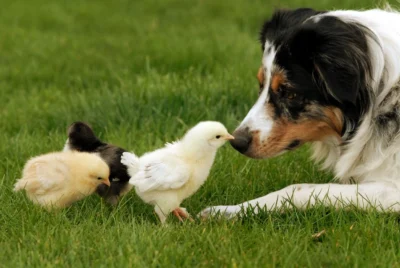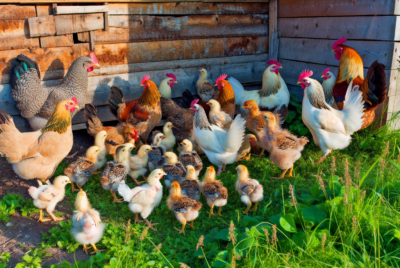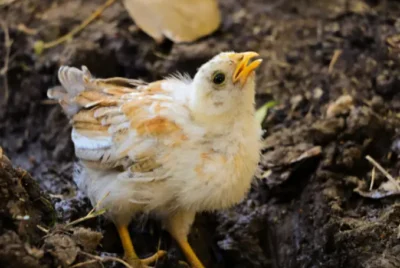How Do You Care for Chickens in the Cold Winter
Winter is here, and with it comes the challenge of keeping your backyard chickens warm and comfortable. So, how do you care for chickens in the winter? Caring for chickens in cold weather is no small feat, but with the right preparations, you can ensure that your flock remains healthy and happy throughout the winter months.
In this blog post, I will provide a comprehensive care plan to help you navigate the challenges of raising chickens during the cold season.
Winterizing the Chicken Coop
As temperatures start to fall, prepping your chicken coop for the chilly winter weather becomes a priority. A well-insulated and ventilated coop can help make sure your chickens are protected from precipitation, wind, and predators, ensuring their happiness and health during the winter months.
By sealing drafts, insulating the coop, and creating a cozy environment, you’ll provide your backyard chickens with the necessary protection from harsh elements.
We’ll delve into different strategies in the forthcoming subsections, focusing on:
- Draft sealing
- Ventilation maintenance
- Coop insulation
- Creating a pleasant atmosphere for your chickens during the colder months
Seal Drafts and Maintain Ventilation
Draft sealing and proper ventilation are key in caring for chickens when winter arrives. Here are some tips to keep your chickens warm and comfortable:
- Seal any cracks in the floorboards or walls of the coop to prevent drafts.
- Add extra bedding to provide insulation and comfort for your chickens.
- Ensure proper ventilation to prevent moisture buildup and maintain air quality in the coop.
However, sealing cold drafts doesn’t mean eliminating ventilation. Proper ventilation is crucial to prevent moisture buildup, respiratory issues, and the growth of harmful bacteria.
To ensure proper ventilation, I recommend installing an adequate ventilation system with vents placed towards the roof of the coop, so that cold air does not flow directly onto the birds. This balance of draft prevention and proper ventilation will help maintain a healthy environment for your chickens in cold temperatures.
Insulate the Coop
Another important part of caring for your chickens in the colder weather is insulating your chicken coop. Proper insulation helps retain the chickens’ body heat within the coop.
You can use various materials, such as thick layers of bedding material like straw or pine shavings, bales of hay, or even the “deep litter method” to insulate the chicken coop during winter.
The deep litter method involves layering fresh bedding on top of soiled bedding, providing insulation and generating heat due to increased microbial activity. This method can be very effective in keeping your coop warm, but it is essential to manage it correctly and with care.
Create a Cozy Environment
A warm and inviting space for your chickens can be achieved by adding extra bedding and ensuring proper ventilation in the coop. Providing additional bedding, such as straw or pine shavings, can help keep your chickens off the cold floor and maintain a comfortable temperature during the winter months.
Regularly cleaning and maintaining the coop, as well as providing proper ventilation, will ensure a cozy environment for your chickens to lay eggs and stay warm during cold nights.
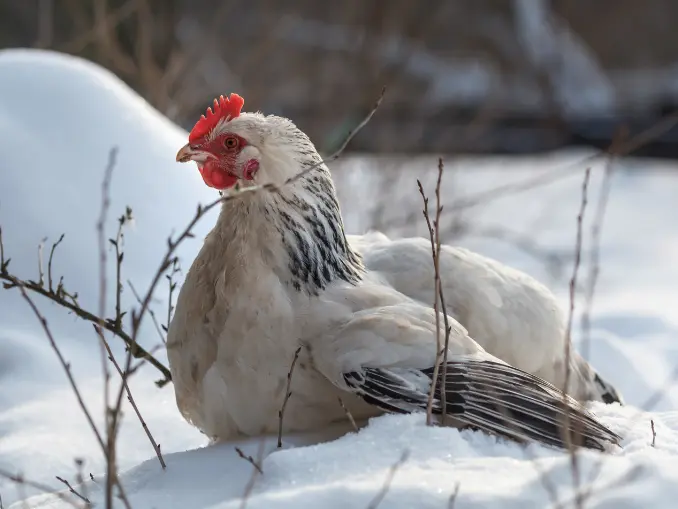
Cold Weather Feeding Tips
Nutrition plays a significant role in keeping your chickens warm and healthy during the winter months. As the temperature drops, chickens require more energy to maintain their body temperature, which may result in an increased feed intake of up to 25%.
To ensure your chickens stay healthy and warm during winter, consider the following:
Increase Feed Intake
Providing more feed for your chickens during winter is essential to help them generate body heat and maintain their energy levels. Chickens are more likely to consume more feed during winter due to their increased metabolic activity, which results in the production of metabolic heat to sustain their normal body temperatures.
Providing enough food access for your chickens during the cold winter weather is key to their overall health and well-being, especially in the winter months.
Offer Warm Foods and Treats
Offering your chickens warm meals and treats can also help them stay warm and maintain their health during cold weather. Foods such as oatmeal and cat food, in moderation, can provide your chickens with the carbohydrates and protein they need to stay warm and healthy during winter.
Incorporating warm foods and treats into your chickens’ diet can make a significant difference in their ability to cope with the cold temperatures.
Provide Access to Grit
Grit, such as cracked corn, is essential for chickens during winter, as it aids in the efficient breakdown of food for digestion. Natural grit may not be easily accessible during winter if the ground is frozen or covered in snow.
Ensure your chickens can access grit by providing a free-choice container of grit in the coop. Grit is a crucial component of your chickens’ winter diet and vital to maintaining their overall health.

Water Management in Winter
Water is a critical nutrient for chickens, playing a role in regulating body temperature, digestion, growth, and egg production. During winter, it’s essential to ensure your chickens have access to fresh, clean water, as frozen water sources can lead to dehydration and other health issues.
Keep Water from Freezing
Preventing your chickens’ water from freezing is crucial during cold weather. To do so, you can use heated waterers or other methods such as placing the water container in a sunny spot or using an insulated container to slow down the freezing process.
If you’re looking for the most efficient and hassle-free solution, consider checking out our comprehensive review of the best heated chicken waterers in 2023. These top-rated waterers have been tested and rated to ensure your flock always has access to liquid water, even in the harshest winter conditions. Ensuring that your chickens have access to unfrozen water is crucial for their overall well-being during the winter months.
Maintain Clean and Accessible Water Sources
Ensuring your chickens have access to clean, fresh water at all times is crucial during winter. Regularly clean the water containers and replace the water to prevent contamination and the growth of harmful bacteria.
Additionally, I recommend keeping water sources away from bedding and manure to maintain cleanliness and reduce disease risk.
Monitor Water Quality
Regularly checking the water quality in your coop is essential to prevent contamination and ensure your chickens stay healthy. Monitor water quality at least twice daily to ensure it remains unfrozen and suitable for your chickens.
By maintaining clean and accessible water sources, you can keep your chickens well-hydrated and healthy throughout the winter months.
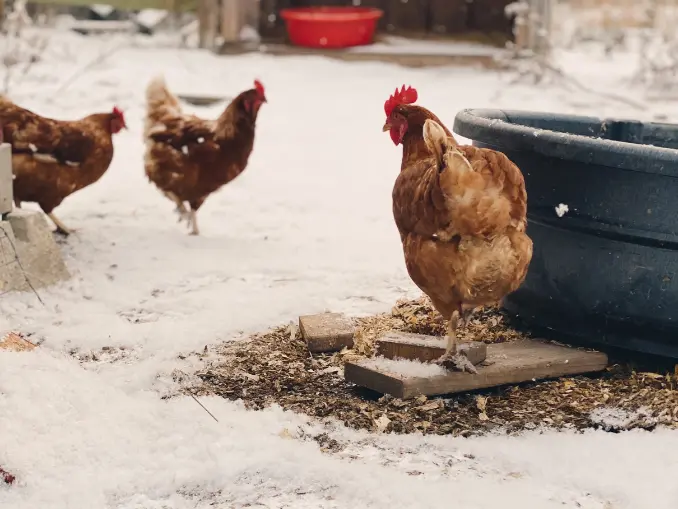
Roosting and Nesting in Cold Weather
Providing adequate roosting and nesting spaces for your chickens during winter is essential for their comfort and well-being. Here are some tips to help you:
- Chickens instinctively roost together and fluff up their feathers to maintain body heat. To accommodate this natural behavior, it’s important to provide proper roost space.
- Use wooden roosts for warmth. Metal roosts can become cold and uncomfortable for chickens during winter.
- Keep nesting boxes clean and warm during winter. Add extra bedding to provide insulation and warmth for your chickens.
Ensure Adequate Roost Space
Ensuring your chickens have enough space to roost comfortably and huddle together for warmth during cold nights is essential for a proper chicken roost. Each chicken should have approximately 12 inches of width along the roost.
Regularly observe your chickens in the evening, and if any are found on the ground, consider extending the roosts to provide sufficient space.
Use Wooden Roosts for Warmth
Choosing wooden roosts over metal or plastic materials is preferable for providing a warmer and more comfortable roosting area for your chickens during winter. Wooden roosts offer better grip and insulation compared to plastic or metal roosts, ensuring a safe and secure perch for your chickens.
Selecting the right material for your roosts can make a significant difference in your chickens’ comfort and well-being during cold weather.
Keep Nesting Boxes Clean and Warm
Regularly cleaning and maintaining nesting boxes is essential for providing a warm and comfortable space for your chickens to lay eggs during winter. Clean nesting boxes can help insulate your chickens and protect them from the cold.
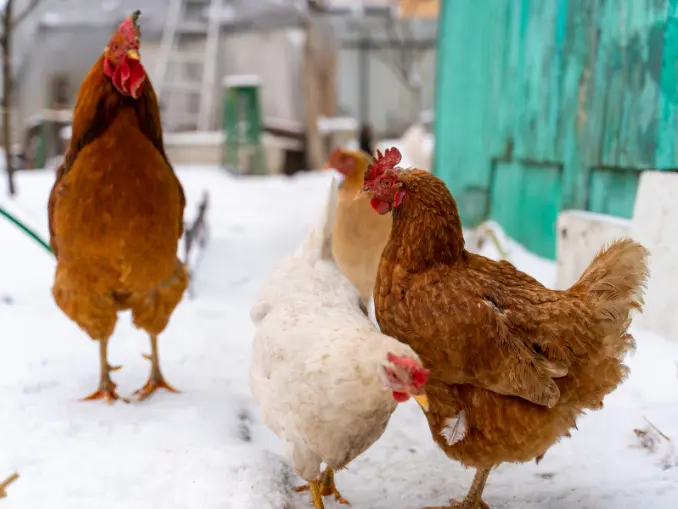
Frostbite Prevention and Treatment
Chickens, particularly those with large combs and wattles, are susceptible to frostbite during winter. Frostbite can be a painful and potentially life-threatening condition for your chickens.
Control Moisture Levels
Maintaining proper ventilation and managing moisture in the coop is crucial for preventing frostbite in your chickens, especially during extreme cold. Excess moisture can lead to a damp environment, which increases the risk of frostbite.
I suggest opening vents and maintaining consistent airflow to ensure a healthy environment for your chickens during winter. Proper moisture control and ventilation can help minimize the risk of frostbite in your chickens.
Apply Protective Measures (e.g., Petroleum Jelly)
Applying petroleum jelly or other protective measures on your chickens’ combs and wattles can help prevent frostbite. Petroleum jelly acts as a barrier against the cold and wind, protecting your chickens’ sensitive tissues from the harsh winter elements.
Regularly applying petroleum jelly to your chickens’ combs and wattles can help keep them safe and comfortable during cold weather.
Monitor and Treat Affected Chickens
Regularly checking your chickens for signs of frostbite is essential to provide appropriate treatment if needed. Signs of frostbite may include gray discoloration of the wattles and combs, as well as a darker red hue on the feet.
If you observe any signs of frostbite, promptly apply the appropriate treatment, such as soaking the affected area in slightly warm water and providing a softer bedding material to protect sore feet.
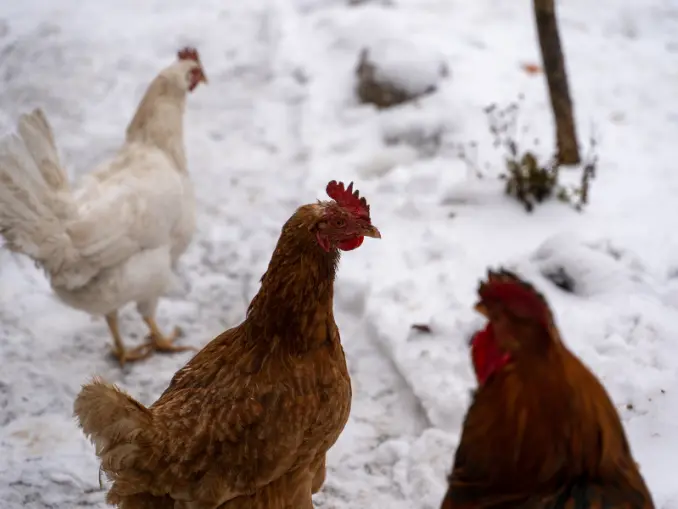
Outdoor Spaces for Chickens in Winter
Add Windbreaks and Shelter
Providing shelter and windbreaks in your chickens’ outdoor area is essential to protect them from cold winds and precipitation during winter. You can use various materials to construct windbreaks in outdoor chicken spaces during the winter months, such as:
- Bamboo shades
- Shrubs
- Fences
- Trees
- Plexiglas sheets
- Clear vinyl
Windbreaks can help maintain a comfortable and protected environment for your chickens.
Use Tarps or Plastic Sheeting
Covering outdoor spaces with tarps or plastic sheeting can create a warmer and more protected environment for your chickens during winter. Heavy-duty clear plastic tarps with reinforcements and grommets are ideal for use in chicken coops during winter, as they are durable and can withstand wind and weather conditions.
By using tarps or plastic sheeting, you can help keep your chickens warm and comfortable during the winter season.
Provide Straw or Hay for Insulation
Spreading straw or hay in your chickens’ outdoor area can provide insulation and warmth during winter. Laying down layers of straw on top of frozen ground or snow can help protect your chickens’ feet from the cold and provide a comfortable surface for them to walk on.
Providing straw or hay for insulation is an easy and effective way to keep your chickens comfortable during the winter months.
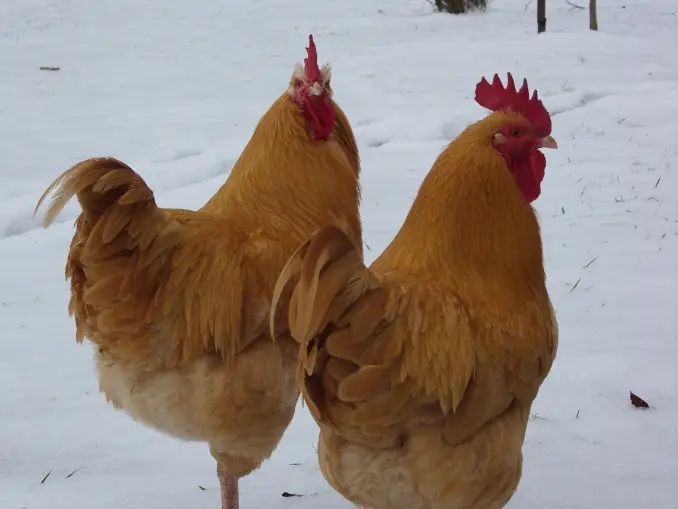
Providing Supplemental Heat Safely
Evaluate the Need for Supplemental Heat
Determining if your chickens require additional heat during winter depends on factors such as their breed, age, and overall health. Some chicken breeds, such as the Chantecler and the Bashang Long-tail chicken, are better able to withstand lower temperatures without needing additional heat.
Young chickens, however, may require supplemental heat as they are less able to regulate their body temperature compared to adult chickens. By evaluating the need for supplemental heat, you can ensure that your chickens receive the appropriate level of warmth during winter.
Choose Appropriate Heat Sources
Selecting safe and effective heat sources for your coop is crucial to prevent fire hazards and other risks. Heat lamps or radiant heaters can be used to provide supplemental warmth for your chickens, with a heat lamp being a popular choice.
It is important to ensure that the product is approved for use around chickens and livestock, take note of any fire risk warnings, and adhere to the installation instructions.
By choosing appropriate heat sources, you can provide additional warmth for your chickens without compromising their safety.
Follow Safety Precautions
Ensuring proper installation and use of heat sources is crucial to prevent fire hazards and other risks. Here are some guidelines to follow:
- Keep all electrical wires away from poultry, water, and flammable litter.
- Only use extension cords for short-term purposes.
- Consult a professional electrician when installing electricity in the coop.

Winter Entertainment for Chickens
Keeping your chickens entertained during winter is essential for their mental and physical well-being. Boredom can lead to behavioral issues, such as feather pecking and aggression, negatively impacting your chickens’ overall health.
Read also: Warning Signs When Chickens Are Bored (How to Stop These)
Offer Enrichment Activities
Providing enrichment activities for chickens in winter is essential for their well-being and to prevent boredom. Suggested activities include:
- Hanging mirrors
- Bells
- Musical instruments to peck
- Treat balls
- Balls of shredded materials
- Wind-up walking toys
I recommend regularly offering these activities to keep the chickens engaged and mentally stimulated. By offering a variety of enrichment activities, you can help your chickens maintain their physical and mental health during winter.
Provide Toys and Puzzles
Toys and puzzles designed for chickens can help prevent boredom and encourage natural behaviors during cold weather. Some examples of homemade chicken toy ideas include hanging a cabbage from a rope, utilizing logs or tree branches, and providing auditory and visual enrichment.
Read also: Best Toys for Chickens (My Top Picks for 2023)
Summary
Caring for chickens during winter can be a challenging but rewarding experience. With the right preparations and strategies, you can ensure that your backyard chickens remain warm, comfortable, and healthy throughout the cold months.
Remember, your chickens rely on you for their comfort and well-being during the cold months. By following these tips and techniques, you can provide your chickens with a safe and cozy environment, ensuring their happiness and health all winter long.

